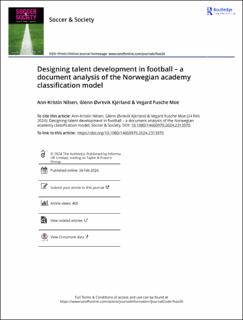Designing talent development in football – a document analysis of the Norwegian academy classification model
Peer reviewed, Journal article
Published version
Permanent lenke
https://hdl.handle.net/11250/3126075Utgivelsesdato
2024Metadata
Vis full innførselSamlinger
Sammendrag
Norwegian football has recently witnessed a surge in the professionalization of talent management, marked by the launch of the Academy Classification Model (ACM) in 2017. The model aims to enhance player development and national performance through improved efficiency and professionalization within top clubs. However, research has raised concerns about the long-term consequences of the increased professionalization of youth football on players’ personal development and well-being, emphasizing the need for future programmes to include pedagogical and ethical considerations. To understand how the ACM incorporates such considerations for players within the context of performance development, we analysed how the model is designed to support talent development using Biesta’s critical pedagogical framework. Our deductive thematic analysis indicates that the ACM primarily focuses on academy structure and performance output rather than on the process of players’ practice, personal development, and well-being. These findings differ from what Biesta emphasizes as crucial pedagogical process components.

